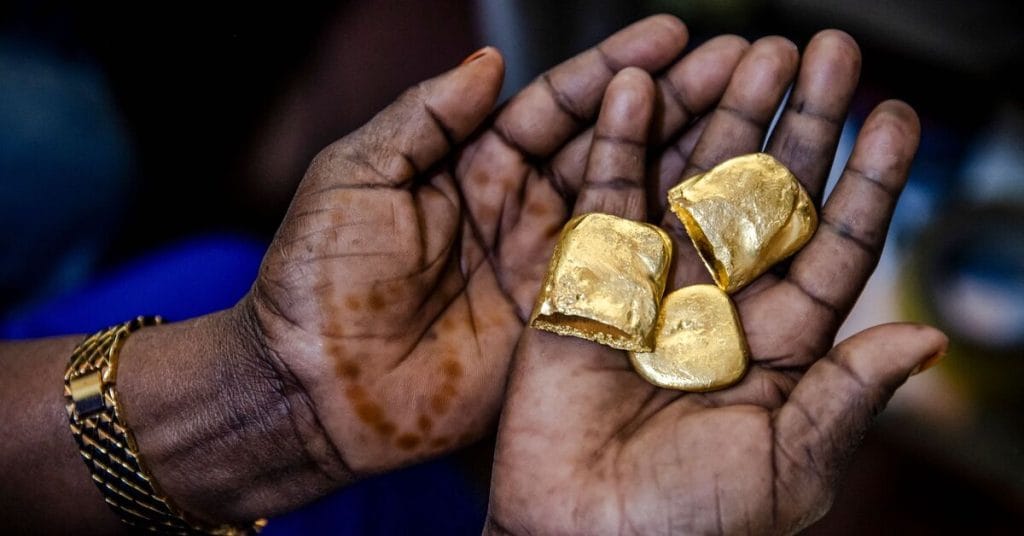Ghana is losing billions of dollars each year to illicit gold trade stemming from its informal mining sector, with much of the unreported gold flowing to the United Arab Emirates, according to a detailed investigation by Swiss non-governmental organization Swissaid.
The report identified a striking gap of 229 metric tons—equivalent to $11.4 billion—between Ghana’s declared gold exports and the corresponding import data from trading partners over a five-year period. The discrepancy points to widespread smuggling, with Dubai emerging as the primary destination for the untracked gold.
Swissaid’s findings offer a rare quantitative look into the opaque world of artisanal gold mining in Ghana, a sector that supports the livelihoods of tens of thousands but is increasingly vulnerable to criminal networks and poor regulatory oversight.
Smuggling Routes and Methods
According to the report, most of the gold is smuggled through neighboring countries, particularly Togo, before being flown to the UAE. In some cases, bullion is also routed through Burkina Faso into Mali, exploiting porous and poorly monitored borders.
“The real volume of smuggled gold is likely much higher,” warned Ulf Laessing, who leads the Sahel programme at Germany’s Konrad Adenauer Foundation. He emphasized that informal couriers often transport gold on commercial flights, bypassing customs checks in Dubai, where hand-carried gold does not have to be declared. This loophole allows large quantities of gold to enter the UAE without scrutiny.
Policy Missteps and Taxation Backlash
The Ghanaian government’s attempts to formalize the artisanal mining sector have produced mixed results. In 2019, the country implemented a 3% withholding tax on artisanal gold exports in a bid to improve revenue collection. However, the policy had the opposite effect: official exports plummeted as more miners turned to smuggling to avoid the levy.
Realizing the negative impact, authorities halved the tax to 1.5% in 2022, which led to a partial recovery in declared exports. In March 2024, the finance minister went a step further by abolishing the tax altogether and credited the decision with driving a significant uptick in formal export activity this year.
Despite the reforms, a substantial volume of gold remains off the official books. Swissaid estimates that 34 metric tons of gold were unaccounted for in 2023, mirroring the total amount recorded as the country’s official artisanal production—suggesting that at least half of the sector’s output was smuggled.
Regulatory Gaps and Slow Reform
A senior official from Ghana’s Minerals Commission acknowledged the seriousness of the findings, describing the issue as “a notorious fact.” However, the country’s Ministry of Finance did not issue a response to the report.
While Ghana earned \$11.6 billion from gold exports last year, authorities are now intensifying efforts to overhaul and centralize gold trade operations. Reforms include stricter licensing, improved tracking systems, and a push for greater transparency in the sector.
Still, experts say progress has been slow. “The current government has shown more interest in addressing long-standing governance challenges in the gold sector that previous administrations ignored,” said Bright Simons of the Imani Center for Policy and Education, a Ghana-based think tank. “But the pace of change has been frustratingly sluggish.”
A Broader Continental Pattern
Ghana’s experience is not unique. Across Africa, gold-producing countries routinely report export figures that fall short of import data logged by trading hubs like the UAE. Although Dubai has introduced measures to combat gold smuggling, including tighter customs checks and registration requirements, these efforts have delivered limited results.
Meanwhile, artisanal mining continues to play a critical role in local economies across sub-Saharan Africa, providing employment for over 10 million people, according to a United Nations report released in May. However, the informal nature of the sector also makes it a ripe target for exploitation by organized criminal groups and militant factions, fueling conflict and undermining state revenues.
As Ghana seeks to strike a balance between supporting livelihoods and curbing illicit trade, experts argue that more robust governance, regional coordination, and international accountability will be key to reversing the long-standing losses from gold smuggling.



